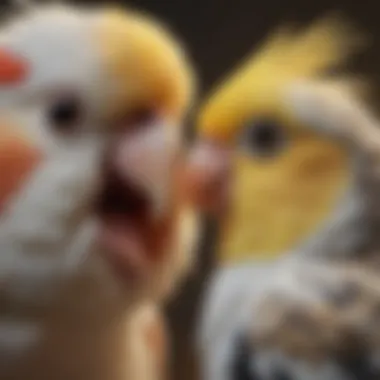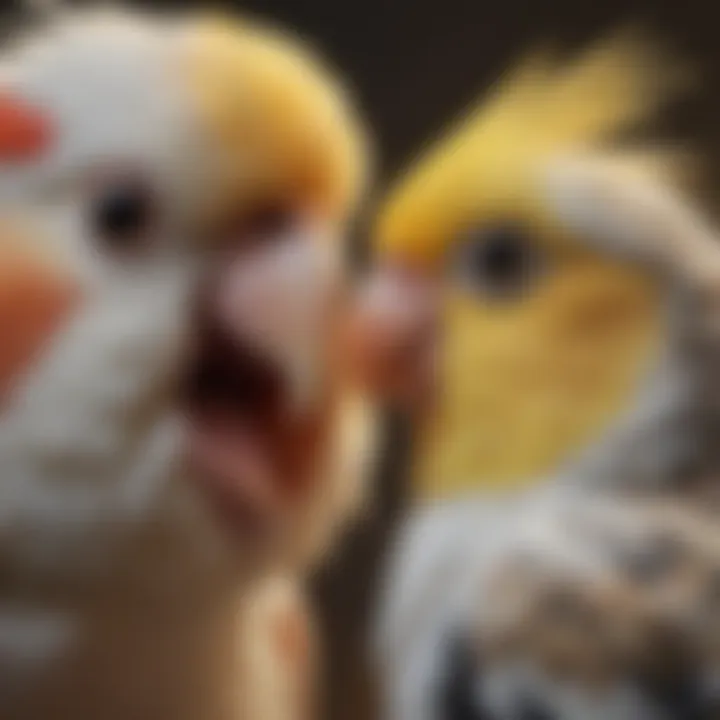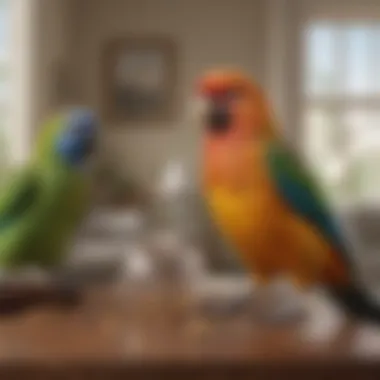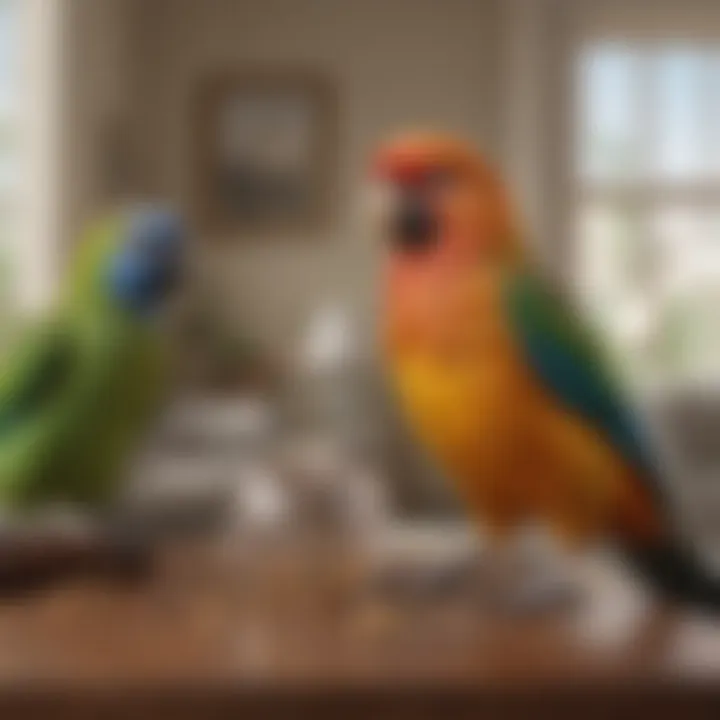Pet Birds as Effective Companions for Reducing Anxiety


Intro
In the world of pet ownership, birds often flutter into the spotlight, not just for their vibrant colors and melodious songs, but for the profound impact they can have on our emotional well-being. Anxiety, a common ailment in today's fast-paced society, has led many to seek solace in the companionship of these feathered friends. Imagine coming home to a chirping parakeet or a gentle budgerigar—these little creatures can effortlessly lift our spirits and lighten our burdens.
The relationship between humans and pet birds is complex and deeply rewarding. Birds have an innate ability to forge strong emotional bonds with their owners, giving rise to feelings of connection and joy. Aside from providing companionship, they play a role in alleviating anxiety through their playful demeanor and simple needs. This article dives into the multifaceted aspects of bird ownership, discussing everything from avian care basics to the emotional benefits that come from such companionship.
As we explore this connection further, we'll shed light on how creating an enriching environment for our feathered companions can directly contribute to a calmer living space for us. Whether you're a seasoned bird owner or contemplating bringing a pet bird into your life, understanding their needs and behaviors can transform your experience and, in turn, help ease anxiety.
Get ready to uncover the layers of mutual support and affection that exist in the human-bird dynamic.
Avian Care Basics
Caring for a pet bird goes beyond feeding it seeds and water. It encompasses understanding their unique needs and providing a nurturing environment that fosters both their physical and emotional health. A well-cared-for bird is not only happier but also significantly contributes to the overall well-being of its owner. Here are some foundational elements of avian care:
Importance of Proper Nutrition
Just like humans, birds require a balanced diet to thrive. Many people might think that a diet solely consisting of seeds is sufficient, but that's a common misconception. A well-rounded diet should include:
- Fresh fruits and vegetables
- Pellets designed for specific species
- Occasional treats like nuts or seeds for enrichment
Providing a diversified diet helps in preventing health issues and establishes a routine which can reduce the anxiety felt by both the bird and the owner.
Understanding Bird Species and Their Needs
Different species of birds have varying needs. For instance, a cockatiel's diet and space requirements differ significantly from those of a finch. Knowing the specific traits and habits of the bird species you plan to care for is crucial. Some key points to consider include:
- Size and space requirements for cages
- Social needs and whether they prefer company or solitary time
- Specific dietary preferences and restrictions
Basics of Birds Habitat Setup
Your bird's habitat should be a safe, stimulating environment. A good setup includes:
- A spacious cage with perches at varying heights
- Toys that encourage mental stimulation and physical play
- Safe areas for exercise outside of the cage
Proper habitat setup fosters play and reduces stress, which can lead to a calmer creature that contributes positively to your own mental state.
Grooming and Hygiene Tips
Regular grooming is essential for your bird's health and can be a bonding exercise. Here are a few tips:
- Regularly trim nails and wings, if needed
- Provide a shallow dish for bathing or spray with water to encourage them to clean themselves
- Keep the cage clean to prevent any health issues
Regular grooming not only promotes healthy birds but also aids in calming nervous owners during the care process.
Interacting with Your Pet Bird
A strong bond with a pet bird can work wonders for anxiety relief. Interaction isn’t merely about feeding or cleaning but involves fostering trust and joy.
Building Trust and Connection
Establishing trust should be your first step. Speak softly, offer treats, and allow your bird to initiate contact. Gradually, they will come to see you as a friend.
Training Techniques and Tips
Training your bird can be beneficial for both parties. Simple commands like "step up" can enhance your connection. Positive reinforcement through treats or praise creates a sense of mutual respect.
Fun Activities for Bird Owners and Their Birds
Engaging activities can reduce anxiety for both birds and owners. Activities can include:
- Creating obstacle courses using safe household items
- Teaching tricks like wave or roll over
- Interactive playtime with toys
Recognizing Bird Cues and Behaviors
Understanding bird behavior is critical. Birds express happiness, fear, and anxiety through body language, such as:
- Fluffing feathers when relaxed
- Ragged wing flapping when distressed
Being attentive to these cues fosters a calm relationship.
Emotional Well-Being of Birds
An emotionally healthy bird is happier and has a positive influence on its owner. Creating an environment that encourages play and social interaction is crucial.
The Role of Play and Socialization
Birds are social animals and thrive with interaction. Providing time out of the cage for play can elevate their mood, boosting the mental health of both you and your bird.
Enhancing Birds' Emotional Health
Ensuring that the environment is stimulating helps. Rotate toys regularly and offer new experiences to keep your bird engaged.
Assessing Bird Stress and Remedies
Learn to identify signs of stress. If your bird exhibits excessive screaming, plucking, or inactivity, consider changing its environment or increasing interaction.
Building Strong Human-Bird Bonds


A strong bond is developed over time through daily interaction. Mutual trust and understanding will foster a peaceful living environment.
Bird Health and Safety
The safety and health of your pet bird should always be a priority. Understanding common health issues, preventative measures, and recognizing signs of illness can keep your feathered friend thriving.
Common Health Issues and Prevention
Be aware of diseases such as psittacosis or feather plucking. Regular check-ups can prevent common problems. Quick action generally leads to better outcomes.
Routine Veterinary Care
Regular vet visits are essential. Just like humans, birds need check-ups and vaccinations to stay healthy. A good avian vet will not only address illness but also offer advice on wellness.
Environmental Hazards to Avoid
Keep your home safe. Certain plants, toxic materials, and even non-stick cookware can harm birds. Learn about potential hazards to ensure a safe habitat.
Signs of Illness or Distress
Watch for any changes in behavior—loss of appetite, lethargy, or ruffled feathers can signal trouble. Addressing these signs early helps maintain a healthy companion.
"A happy bird is a healthy bird, and a happy bird can work wonders for the heart."
Fun Facts and Quirky Insights
Birds aren't just pets—they're fascinating creatures. Here are some insights you might find intriguing:
Unique Traits of Popular Bird Species
Each bird species has its own quirky traits. African Greys are known for their intelligence and ability to mimic speech, while Lovebirds are champions of social interaction.
Historical and Cultural Significance of Birds
Birds have played vital roles in different cultures. From ancient Egyptian deities to symbols of freedom, they feature prominently throughout history.
Famous Bird Owners and Their Stories
Many notable figures have had pet birds that shaped their lives. Artists, celebrities, and even politicians have found companionship in their feathery friends, influencing their work and perspectives.
By understanding both the care and benefits of keeping birds, owners can integrate positive practices into their lives, ensuring a mutually beneficial relationship that enhances mental well-being and alleviates anxiety.
Prelude
In our fast-paced world, the quest for mental well-being has become crucial. Anxiety, a common ailment, can seep into daily life, leaving individuals feeling overwhelmed. Studies have shown that companion animals can play a vital role in alleviating symptoms of anxiety. Among these, pet birds have gained notable traction through the years, becoming cherished companions for many.
Pet birds, with their bright personalities and distinctive behaviors, offer more than just visuals—they provide comfort, companionship, and joy. This article takes a closer look at how these feathery friends can help reduce anxiety, enriching the lives of their owners. Each section will explore the emotional connections formed, the psychological benefits of owning birds, and practical advice for integrating avian companions into daily life.
Observing the simple yet intricate ways pet birds communicate and interact with their owners taps into a deeper well of understanding about emotional support. This article aims to illuminate those dynamics, highlighting not only the joy of ownership but also the understanding needed for a fulfilling relationship between human and bird.
Understanding the world of pet birds is particularly timely. With people increasingly turning to animals for support, the growing interest in avian companions indicates a shift towards more diverse options in pet ownership. By processing scientific research and personal anecdotes, we hope to present a rounded perspective on how having a bird can help create a peaceful home environment.
Defining Anxiety
Anxiety manifests in various forms, ranging from occasional nervousness to severe panic attacks. The American Psychological Association defines it as an uncontrollable fear or worry about what’s to come. It can lead to various physical reactions—like sweating, trembling, or an increased heart rate—that interfere with daily tasks.
Living with anxiety can feel like a constant uphill battle. Individuals might find themselves avoiding places, people, or situations that cause discomfort. This retreat often leads to social isolation, accentuating the anxiety itself. However, pet ownership, particularly of birds, shows promise as a potential remedy, often lending a fresh perspective on reducing symptoms.
The Growing Interest in Pet Birds
In recent years, the trend of owning pet birds has soared, akin to how a parakeet takes flight. Many factors converge to create this evolving landscape of avian appreciation. First and foremost is the sheer number of available species, from the compact and charming budgerigar to the more exotic cockatoo. Each bird carries its own quirks and personality, making them appealing to diverse lifestyles.
Additionally, the increase in awareness about the emotional benefits of pets has not gone unnoticed. Birds are generally less demanding compared to dogs or cats, requiring less space yet still offering companionship and interaction. Many are also now embracing social media for sharing their experiences with pet birds, bringing communities of bird enthusiasts together. The platforms on sites like Reddit or Facebook allow people to connect, share tips, and celebrate the joy that comes from having a feathered companion.
By highlighting the unique attributes of birds as pets, this article aims to explore not just the joy they bring but also their potential in reducing anxiety and fostering a nurturing environment.
The Emotional Connection Between Humans and Birds
In a world where mental health struggles are becoming more common, the bond formed between humans and birds can serve as an unexpected source of comfort and anxiety relief. Understanding this emotional connection reveals how pet birds can positively influence our well-being. These creatures, often small and seemingly simple, hold the potential to foster a sense of responsibility, companionship, and emotional stability. Not only do they invite joy into our lives, but they also create deeper layer of emotional sustenance that can aid in managing anxiety.
Attachment Theory and Pet Birds
Attachment theory provides a foundational framework for understanding how relationships develop and the psychological benefits they bring. According to this theory, strong bonds are formed in early life, laying the groundwork for later relationships. For many, the bond with a pet bird extends beyond mere companionship; it can become a primary attachment relationship. Birds, such as parakeets and cockatiels, often develop unique relationships with their owners. This connection can result in feelings of security and trust that are essential for reducing anxiety.
When a bird recognizes its owner, often through vocalizations or particular behaviors, it establishes a sense of communication and understanding. The chirps, whistles, and chattering of these delightful avians are not just sounds; they create a dialogue that mirrors the back-and-forth exchange found in human relationships. It’s in these interactions that a person can experience a sense of being needed as they respond to their pet, further enhancing emotional bonding.
Social Interaction and Emotional Support
The presence of a pet bird offers more than just silent company; it encourages meaningful social interaction. For many individuals struggling with anxiety, engaging in conversation with their feathered friend can be surprisingly therapeutic. Birds are often curious creatures, displaying unique personalities that invite playful banter and shared moments, fostering a positive environment.
- Socializing with a pet bird can encourage the owner to step out of their comfort zone, whether through talking, singing, or even playtime.
- Engaging with a bird can act as a catalyst for forming connections with others, such as fellow bird enthusiasts or local clubs.
- The very act of caring for a pet bird—feeding it, cleaning its cage, or offering enrichment activities—provides a routine that can ground anxious thoughts and fears.
By meeting these needs, owners not only fulfill their pet’s requirements but also gain tangible emotional support from the relationship.
“A pet bird can be a mirror of our moods; their reactions often reflect our feelings back at us.”
This reciprocal relationship tends to build resilience, and as the owner finds a reliable source of emotional support in their bird, they may discover new tools to manage anxiety, blurring the lines between the caretaker and the buddy.
Recognizing and nurturing the emotional connection between humans and birds is essential for both parties. The joy, stability, and social interaction that pets provide —especially birds— create a unique and soothing impact on mental health, highlighting the need for mutual understanding and care in these relationships.


Psychological Benefits of Bird Ownership
Birds are often considered more than just pets; they can be confidants, companions, and even sources of therapy for many individuals. The psychological benefits of owning a bird can play a pivotal role in alleviating anxiety and enhancing overall mental wellness. Being around birds presents a unique dynamic that fosters emotional connections and can ease the burdens of daily stressors. As individuals nurture these relationships, they often find a sense of comfort and stability that can profoundly affect their mental health.
Reduction of Stress Levels
Numerous studies reveal that interacting with pets can significantly reduce stress levels, and birds are no exception. The simple act of watching a bird flit about or listening to its melodic chirping can create a tranquil environment that promotes relaxation. Home environments filled with the vibrant presence of birds may lead to lower cortisol levels, which is a hormone linked to stress.
Caring for a pet bird requires establishment of daily routines, including feeding, cleaning, and playtime. This structure can provide a much-needed sense of purpose for individuals battling anxiety. Having something to care for can keep one's mind engaged, pulling focus away from personal worries.
"Owning a pet bird can shift one’s focus from stressors to the joy of nurturing a unique life."
Additionally, the rhythmic sounds and visual stimuli of birds can promote mindfulness. For many, paying attention to their birds' movements and sounds becomes an exercise in staying present. This can be beneficial for those who feel overwhelmed or caught in cycles of anxious thought.
Improvement in Mood and Happiness
The presence of pet birds can also lead to synchronous improvements in mood. Individuals may feel a surge of happiness from small interactions—like when their feathered friend discovers a new toy or mimics a sound. These seemingly trivial moments can evoke laughter and joy, creating a positive feedback loop of emotion.
Moreover, research indicates that caring for birds can foster feelings of accomplishment and happiness. Regular interaction with a bird not only cultivates joy but can also aid in reducing feelings of loneliness and isolation. The bond that develops between the bird and owner can be a source of unconditional emotional support.
Listed below are notable ways in which pet birds can contribute to improved mood:
- Affectionate Interaction: Birds often show affection through physical closeness, which can be comforting to owners.
- Vibrant Personalities: Many bird species display playful behaviors, from playful antics to vocalizing, which can evoke laughter and feelings of joy.
- Social Connection: Bird owners often bond over shared interests, leading to new friendships, thereby improving overall mood.
Bird ownership presents a beautifully unique way to manage mental health challenges and build emotional resilience. The focus on nurturing a pet bird can provide a cushion against the harsh realities of life, turning stress into calm and worry into joy.
Understanding Bird Behavior and Communication
Understanding the behavior and communication patterns of birds is essential for pet owners, particularly for those who seek anxiety relief through their companionship. Recognizing how birds express themselves helps create a more harmonious relationship between the bird and its owner. This knowledge can play a pivotal role in managing stress and enhancing emotional connections. Just like humans, each bird has its own set of quirks and moods, which adds layers to the experience of ownership. If handled sensitively, these elements can foster a calming atmosphere that benefits both parties.
The Language of Birds
Birds have a unique way of communicating with their owners. Their sounds and behaviors form a language that's rich with nuance. One can argue that understanding this language is akin to learning to read a book with no words—it's all about context and observation. For instance, when a parrot puffs up its feathers and chirps excitedly, it could indicate happiness or an invitation to play. Conversely, a drawn-back stance and soft chirps may signal anxiety or discomfort. These subtle cues are vital in building a robust dialogue between the owner and their feathered friend.
Many bird owners describe moments when they felt a strong connection simply by interpreting these signals. A quiet moment spent observing a budgie at play or listening to a cockatiel whistle can be surprisingly grounding. Engaging in these moments can divert focus from one’s stressors. It’s these everyday exchanges that can alleviate anxiety even without a deliberate action on the owner’s part. Recognizing and responding to these communication methods nurtures a trusting bond that can significantly enhance emotional well-being.
"The language of birds has a way of softening the soul, often saying what words cannot."
Behavioral Interactions that Alleviate Anxiety
The interactions between owners and their birds can serve as a natural remedy for anxiety. Many activities, from simple petting to watching a canary flutter about its cage, provide a calming backdrop to daily life. An owner might find that the rhythmic sound of a bird preening itself serves as a soothing background noise, much like a soft melody that wraps around you.
Certain behaviors exhibited by birds can also trigger stress relief for their owners. For example:
- Playing Together: Engaging in play, such as teaching a bird new tricks or playing with toys, provides a welcome distraction and encourages laughter and joy.
- Free Flight: If permitted, letting a bird fly in a safe space enhances trust between the bird and owner, while also offering physical activity that is beneficial for both.
- Shared Calm Moments: Sitting quietly together while a bird preens or rests can invite a shared sense of peace into the room, creating a meditative like environment.
To truly benefit from these interactions, owners need to understand what behaviors their specific bird engages in. Knowing that a finch loves to hop around the cage might inspire the owner to take time each day to bask in the light of life and joy. This awareness not only fosters a connection but also helps keep the owner's mind off anxiety, reminding them to enjoy the present moment. In feeding and caring for their birds, owners discover not only their own routines but also how to find joy in life's small details.
Creating a Suitable Environment for Anxiety Relief
Creating an optimal living space for pet birds is crucial not just for their well-being, but for alleviating anxiety in their owners as well. A thoughtfully designed habitat can affect the mental state of both the bird and the human involved. When people come home to a vibrant environment filled with life, they often experience a reduction in stress. Birds, with their beautiful plumage and delightful sounds, become more than just pets; they act as sources of healing and companionship.
To create a an effective environment, it's essential to consider elements such as the bird's physical habitat, social settings, and interaction levels. Each aspect plays a vital role in ensuring that the owner can experience the calming benefits of bird ownership. Providing the right surroundings encourages positive interactions and emotional connections.
Habitat Setup and Maintenance
Habitat setup is a foundational step in ensuring that pet birds thrive and contribute to their owners' mental relief. The living space should reflect the natural environment of the bird species you own. This means understanding their needs for space, light, and safety. Here’s a few components that are important:
- Cage Size and Placement: A spacious cage allows birds to fly and explores their surroundings. Positioning the cage in a common area can keep them engaged with their owners while fostering a sense of belonging.
- Safe and Cozy Environment: Use appropriate bedding materials that provide comfort and warmth for the birds while ensuring they are safe to chew. Avoid toxic materials and always keep the area clean to prevent illnesses.
- Lighting and Temperature: Provide adequate natural light, as some birds benefit significantly from exposure to sunlight. Additionally, maintaining a stable temperature can help the birds feel secure and comfortable.
Routine maintenance of the habitat is equally important. Birds are often sensitive to changes in their environment. Regularly cleaning the cage and refreshing their toys can keep envy at bay and encourage a stimulating atmosphere.
“A well-kept environment speaks volumes about the love we have for our feathery friends and our own peace of mind.”
Incorporating Bird Enrichment Activities
Engaging pet birds through enrichment activities can alleviate anxiety for both the bird and the owner. When birds are occupied and mentally stimulated, it reduces the occurrence of stress behaviors such as excessive screeching or feather plucking. Here are a few effective ways to keep your feathered companions entertained:
- Toys and Puzzles: Different types of toys are crucial. Rotate toys regularly to prevent boredom. Puzzles that require problem-solving can aid in cognitive development while engaging their instinctual foraging behavior.
- Social Interaction: Spend dedicated time playing with the bird. Whether it’s teaching a new trick or simply talking, these interactions can forge a deeper bond and foster a nurturing environment.
- Outdoor Experiences: If safe and feasible, exposing birds to the outdoors can be invigorating. Fresh air, new sights, and sounds can provide mental stimulation, benefiting their mood while allowing owners to unwind as well.
By thoughtfully creating an environment that is both resourceful and safe, pet owners can cultivate a serene atmosphere that reduces anxiety. This tailored space enhances the bond between humans and their feathered friends, leading to a more harmonious household.
Personal Stories: Anecdotes from Bird Owners
Personal stories serve as powerful testimonials to the emotional and psychological impacts that pet birds can have on their owners facing anxiety. These anecdotes provide readers with relatable experiences, painting a vivid picture of how the companionship of birds has offered solace in times of distress. By diving into real-life scenarios, we can discern the personal connections that blossom between humans and their feathered friends, highlighting the profound ways these relationships can alleviate feelings of loneliness and tension.
Case Studies of Anxiety Relief
Take, for example, the story of Melissa, a young professional who found herself overwhelmed by the pressures of work and life. She decided to adopt a budgerigar, whom she lovingly named Chirpy. Before Chirpy’s arrival, Melissa struggled with persistent feelings of anxiety, often feeling isolated in her high-paced job. However, she soon discovered that having a pet bird not only brightened her home but also transformed her emotional landscape. The very act of caring for Chirpy—cleaning the cage, feeding, and engaging in playful interactions—created a routine that provided a sense of purpose and responsibility, mitigating her anxious thoughts.
Another case comes from Amir, who shared in an online forum about his struggle with social anxiety. He adopted a cockatiel named Sunny. Amir noted that the joyful chirps of Sunny echoed through his home, creating an ambiance that lifted his spirits. He shared how he often felt more inclined to engage with friends when they visited, as they were often drawn to Sunny’s charming antics. This connection not only fostered social moments but also challenged Amir’s anxiety by encouraging him to open up more, both about himself and his beloved bird.
Shared Experiences and Lessons Learned
Many bird owners recount similar stories, underscoring common themes: the sense of companionship and the unintentional lessons learned about patience, empathy, and care. For instance, in a discussion on Reddit, various users shared tales of how training a bird taught them the importance of consistent effort and understanding body language.
- Patience: Many owners remark that training a bird to mimic sounds or perform tricks requires a steady hand and a calm demeanor. This not only benefits the birds but helps owners regulate their own anxiety levels through gentle repetition.
- Empathy: Birds exhibit their own moods and feelings. Understanding when a bird feels anxious or threatened allows owners to practice empathy, further fostering emotional resilience within themselves.
- Joy in Simplicity: Owners share a newfound appreciation for the small joys of life—the simplicity of watching a bird bathe or feeling a gentle brush of feathers against their face. This shift fosters mindfulness, a practice known for its anxiety-reducing benefits.


In the end, the anecdotes shared by bird owners are more than just stories; they are a collective testament to the real, tangible impacts that these affectionate creatures have on mental health. Through their experiences, one can glean the profound message that the companionship of a pet bird goes beyond mere enjoyment—it presents a unique avenue toward emotional healing and the relief of anxiety.
Scientific Studies Supporting Bird Ownership and Mental Health
Research into the connection between pet ownership and mental health has started to bloom, with an increasing number of studies focusing on the unique role that birds play. The impact of interacting with these creatures extends beyond simple companionship; it touches on emotional and psychological well-being. Understanding how and why these findings support the positive relationship between pet birds and anxiety relief is crucial for both current owners and potential bird parents.
Reviewing Recent Research
Recent studies suggest that keeping birds as pets can have meaningful benefits in managing anxiety levels. A landmark study published in the Journal of Psychiatric Research illustrated that participants who spent time with their pet birds exhibited significant reductions in anxiety symptoms. The rhythmic sounds of birds chirping can act as natural background music, promoting a sense of tranquility.
- Enhancements in Mood: Participants noted an improved mood following interactions with their birds, marking a decrease in feelings of loneliness and isolation.
- Mindfulness Benefits: Engaging in the care routines, such as feeding or cleaning the cage, often promotes mindfulness, keeping one grounded in the moment and alleviating anxious thoughts.
Furthermore, a meta-analysis encompassing various studies revealed that the ownership of birds correlated with lower instances of depression and increased levels of overall well-being. This research underscores the necessity of acknowledging pet birds as valid emotional support animals, emphasizing their unique contributions to mental health.
Findings and Implications for Bird Owners
The implications of these findings are not merely academic; they have real-world applications for bird owners. Understanding the psychological benefits can guide owners in fostering positive interactions with their pets. Below are some key takeaways:
- Social Interaction: The mere presence of a bird can combat feelings of anxiety through companionship. When people talk to their birds or mimic sounds, they often experience a release of endorphins, leading to a feeling of happiness.
- Routine and Structure: Birds require a consistent care routine, which in turn helps owners establish structure in their daily lives. Having this responsibility can provide a sense of purpose, mitigating feelings of anxiety.
- Learning and Growth: Owners have the opportunity to learn about bird behavior and care techniques, creating engagement and challenge that can distract from negative thoughts.
While more research is needed to draw definitive conclusions, it is clear that the simple act of owning a bird holds profound meaning. The emotional connection formed with pet birds can serve as a powerful tool in managing anxiety.
"Birds may seem small in stature, but their impact on our mental well-being is monumental."
As bird owners, embracing these findings can encourage a nurturing environment that allows both the owner and the bird to thrive. Thus, prospective bird parents may wish to consider these insights as they embark on their journey of avian companionship.
Practical Advice for Prospective Bird Owners
When considering bringing a pet bird into your home, there's more to the process than simply picking a colorful feathered friend. The decision to adopt a bird can greatly influence your mental health, particularly if you're seeking relief from anxiety. Thus, having a well-rounded understanding of what to expect is essential.
Choosing the Right Bird Species
Choosing the right bird species is absolutely vital. Not all birds share the same temperament or care needs. For instance, Cockatiels are known for their friendly and affectionate nature but require daily interaction to thrive. On the other hand, Budgerigars (or parakeets) can be more independent and may not demand as much attention, making them suitable for busier households.
When selecting your feathered companion, consider the following factors:
- Size: Larger birds like Amazon parrots may require more space and resources compared to smaller birds like Canaries or Finches.
- Social Needs: Different species have varying social requirements. Some, like Lovebirds, thrive in pairs and need constant companionship.
- Noise Levels: Understanding how loud a species can be is crucial. Birds like Macaws can be quite vocal, while Cockatiels may chirp softly.
- Lifespan: Birds can live a long time, sometimes exceeding 20 years. Be prepared for a long-term commitment.
Preparing for Bird Adoption
Before you welcome a bird into your life, it’s imperative to get everything in order. This preparation can make the transition smoother and help reduce both your and your bird's anxiety.
- Setup a Comfortable Habitat: Create a safe and inviting environment with ample space for your bird to move freely. Ensure you're equipped with a sturdy cage, plenty of perches, and appropriate toys.
- Research Nutrition Needs: Provides a balanced diet specific to the species of bird you choose. Seed mixes, pellets, and fresh fruits and vegetables will likely need to be part of their diet.
- Understand Commitment: Bird ownership requires time, care, and patience. Allocate time daily for bonding activities and training.
- Emergency Planning: Become familiar with avian veterinarians in your area, and have a plan for emergencies. It’s better to be safe than sorry.
- Socialization Plans: Birds are social creatures, so plan on how you’ll interact with your new pet. Consider joining bird clubs or communities online, like those found on reddit.com for additional support and advice.
"Birds might be small, but their size doesn’t dictate the big impact they can have on our lives!"
In addition to the practical aspects, consider your own emotional readiness to take on a pet bird. Understanding their unique behaviors and quirks can lead to a richer bond. Owning a bird is an opportunity to not only provide companionship but also to foster emotional resilience.
Challenges in Bird Ownership
Owning a bird undoubtedly brings joy, companionship and can help reduce anxiety for many people. However, it’s crucial to address the challenges that come along with bird ownership. Understanding these difficulties isn't just about preparing for what might go wrong but is about boosting the rewarding experience of owning pet birds.
Both first-time bird parents and seasoned ones can encounter hurdles that may impact the well-being of their feathered friends. By analyzing these challenges, owners can become better equipped to create a supportive environment for their birds while also ensuring their own emotional comfort.
Potential Anxiety Triggers for Birds
Birds are sensitive creatures. Their little hearts and brains respond to various stimuli in their environment that can trigger anxiety. A bustling household can be overwhelmingly chaotic for a timid budgie or a cockatiel. Here are some common anxiety triggers for pet birds:
- Loud Noises: Sudden loud sounds, like thunder or fireworks, can send birds into a tailspin of panic. Birds have keen hearing; this can be distressing for them.
- Strange Pets: Dogs or cats that might roam too close could cause stress, making birds feel threatened even if they are safely caged.
- Changes in Routine: A shift in a family's daily schedule can create confusion for pet birds. They thrive on routine, and unexpected changes may impact their behavior negatively.
"Recognizing and addressing these triggers not only helps the bird but reinforces the bond shared between the pet and its owner."
To combat these triggers, it's essential to establish a safe haven for the bird. A quiet room away from high traffic areas can help a nervous bird feel more secure.
Balancing Responsibility with Mental Health Benefits
Pet ownership should always be a two-way street. While pet birds provide comfort and reduce anxiety for their owners, they also require a considerable amount of care. This can sometimes seem overwhelming, especially if you don’t possess a previous bird-keeping experience.
Birds need:
- Daily Interaction: Your feathered companion thrives on connection. If they don't get enough social interaction, they can become lonely and agitated.
- Proper Nutrition: It’s not just feeding them birdseed and calling it a day. A diet rich in fruits, veggies, and specifically-formulated bird foods is essential.
- Veterinary Care: Routine check-ups can help detect potential health issues before they become serious concerns.
Finding a balance between the responsibilities of bird care and the psychological benefits they offer can be tricky. However, integrating bird care into your own daily routine might enhance your own mental health. Spending time feeding your bird or engaging in play can serve as a calming activity, positively affecting both your bird-watching experience and your mental state.
Ultimately, realizing that the growth in your emotional well-being goes hand in hand with effective bird care can make the journey beneficial for both of you.
Finale
When it comes to the relationship between pet birds and anxiety relief, the conversation carries deeper implications than mere companionship. Understanding the nuances of this connection provides invaluable insights into both mental health and the everyday realities of caring for birds. The notion that a small creature can impact well-being is not just thought-provoking—it’s transformational.
Summarizing the Benefits
A thorough exploration into the benefits of having pet birds reveals layers of advantages. First and foremost, these feathery companions offer emotional support that can be palpable. Whether it's the soothing sounds of a canary or the playful antics of a parakeet, they become a source of joy. Additionally, the responsibility of caring for a pet can also enhance structure and purpose in daily routines. It’s a two-way street: while birds gain a home, their owners gain a multitude of benefits.
- Reduction in stress levels: Pet birds can lower cortisol levels, thanks to their calming presence.
- Enhancement of mood: Just observing their colorful plumage can lift spirits.
- Fostering social interactions: Bird communities provide avenues for human connection.
Every chirp brings forth a reminder that life has its playful moments, often overshadowed by everyday worries.
A Call to Consider Pet Birds for Mental Wellbeing
Ultimately, considering the incorporation of a bird into one’s life extends beyond just pet ownership; it represents a commitment to mental wellness. The unique bond developed between humans and these avian companions illustrates the profound impact of gentle connection. As more individuals confront the growing pressures of modern-day existence, recognizing birds as viable companions for mental health support becomes essential.
Ultimately, adopting a bird isn't just about adding another pet to your household; it's about bringing home a living reminder of resilience and joy. So if you're on the fence about joining the bird-owner community, know that many have walked this path before you, and you've got a welcoming flock ready to nestle into your life.
“A bird does not sing because it has an answer. It sings because it has a song.” - Chinese Proverb















